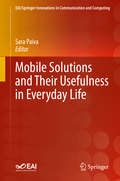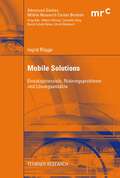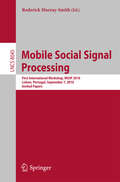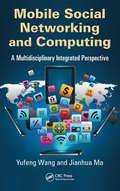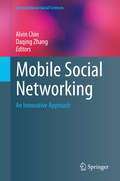- Table View
- List View
Mobile Web and Intelligent Information Systems: 14th International Conference, MobiWIS 2017, Prague, Czech Republic, August 21-23, 2017, Proceedings (Lecture Notes in Computer Science #10486)
by Muhammad Younas Irfan Awan Irena HolubovaThis book constitutes the refereed proceedings of the 14th International Conference on Mobile Web and Intelligent Information Systems, MobiWIS 2017, held in Prague, Czech Republic, in August 2017. The 23 full papers together with 4 short papers presented in this volume were carefully reviewed and selected from 77 submissions. The call for papers of the MobiWis 2017 included new and emerging areas such as: mobile web systems, recommender systems, security and authentication, context-awareness, mobile web and advanced applications, cloud and IoT, mobility management, mobile and wireless networks, and mobile web practice and experience.
Mobile Web and Intelligent Information Systems: 13th International Conference, MobiWIS 2016, Vienna, Austria, August 22-24, 2016, Proceedings (Lecture Notes in Computer Science #9847)
by Muhammad Younas Irfan Awan Natalia Kryvinska Christine Strauss Do Van ThanhThis book constitutes the refereed proceedings of the 13th International Conference on Mobile Web and Intelligent Information Systems, MobiWIS 2016, held in Vienna, Austria, in August 2016. The 36 papers presented in this volume were carefully reviewed and selected from 98 submissions. They were organization in topical sections named: mobile Web - practice and experience; advanced Web and mobile systems; security of mobile applications; mobile and wireless networking; mobile applications and wearable devices; mobile Web and applications; personalization and social networks.
Mobile Web and Intelligent Information Systems: 12th International Conference, MobiWis 2015, Rome, Italy, August 24-26, 2015, Proceedings (Lecture Notes in Computer Science #9228)
by Muhammad Younas Irfan Awan Massimo MecellaThis book constitutes the refereed proceedings of the 12th International Conference on Mobile Web and Intelligent Information Systems, MobiWIS 2015, held in Rome, Italy, in August 2015. The 17 full papers and 3 short papers presented were carefully reviewed and selected from 55 submissions. The papers are organized in topical sections such as mobile services and applications; usability and visualization; mobile networks and applications; mobile data services; smart phones and mobile commerce applications.
Mobile Web 2.0: Developing and Delivering Services to Mobile Devices
by Syed A. Ahson Mohammad IlyasFrom basic concepts to research grade material, Mobile Web 2.0: Developing and Delivering Services to Mobile Devices provides complete and up-to-date coverage of the range of technical topics related to Mobile Web 2.0. It brings together the work of 51 pioneering experts from around the world who identify the major challenges in Mobile Web 2.0 appl
Mobile Virtual Work: A New Paradigm?
by J. H. Erik Andriessen Matti VartiainenDear Reader This is a book about mobile virtual work. It aims at clarifying the basic concepts and showing present practices and future challenges. The roots of the book are in the collaboration of few European practitioners and - searchers, who met each other under the umbrella of the Swedish SALTSA programme (see next page) in January 2002 in Stockholm. The group was first called ‘ICT, Mobility and Work Organisation’ but redefined itself quickly as ‘Mobile Virtual Cooperative Work’ group. The change of the name reflects the development of reasoning in the group. We could not find much material on mobile work, certainly not systematic studies, - though a growing interest in mobile technologies and services could be found. Practices of telework and virtual organizations were better known, but we were convinced that the combination with mobile work was so- thing different and new. Our main target became to understand what it was all about. The next step was an expert meeting in October 2004 at Rånäs Castle again in Sweden. A wider group of experts was invited to present their views on mobile virtual work and ideas about book chapters from different perspectives of working life. Some of the expertise could be found through the network of the AMI@Work family created by the New Working En- ronments unit of the European Commission’s Information Society Dir- torate-General. Also close collaboration was developed with the related MOSAIC program.
Mobile User Research: A Practical Guide (Synthesis Lectures on Mobile & Pervasive Computing)
by Sunny Consolvo Frank R. Bentley Eric B. Hekler Sayali S. PhatakThis book will give you a practical overview of several methods and approaches for designing mobile technologies and conducting mobile user research, including how to understand behavior and evaluate how such technologies are being (or may be) used out in the world. Each chapter includes case studies from our own work and highlights advantages, limitations, and very practical steps that should be taken to increase the validity of the studies you conduct and the data you collect. This book is intended as a practical guide for conducting mobile research focused on the user and their experience. We hope that the depth and breadth of case studies presented, as well as specific best practices, will help you to design the best technologies possible and choose appropriate methods to gather ethical, reliable, and generalizable data to explore the use of mobile technologies out in the world.
Mobile User Experience: Patterns to Make Sense of it All
by Adrian MendozaThis is your must-have resource to the theoretical and practical concepts of mobile UX. You’ll learn about the concepts and how to apply them in real-world scenarios. Throughout the book, the author provides you with 10 of the most commonly used archetypes in the UX arena to help illustrate what mobile UX is and how you can master it as quickly as possible. First, you’ll start off learning how to communicate mobile UX flows visually. From there, you’ll learn about applying and using 10 unique user experience patterns or archetypes for mobile. Finally, you’ll understand how to prototype and use these patterns to create websites and apps. Whether you’re a UX professional looking to master mobility or a designer looking to incorporate the best UX practices into your website, after reading this book, you’ll be better equipped to maneuver this emerging specialty. Addresses the gap between theoretical concepts and the practical application of mobile user experience designIllustrates concepts and examples through an abundance of diagrams, flows, and patternsExplains the differences in touch gestures, user interface elements, and usage patterns across the most common mobile platformsIncludes real-world examples and case studies for this rapidly growing field
Mobile, Ubiquitous, and Pervasive Learning: Fundaments, Applications, and Trends (Advances in Intelligent Systems and Computing #406)
by Alejandro Peña-AyalaThis book is concerned with the mobile, ubiquitous, and pervasive learning arena. It present a collection of works corresponding to four categories: reviews, studies, conceptual proposals, and approaches. As a result of the submission and revision processes eight manuscripts were accepted and organized into the aforementioned four parts as follows: ·Review: a couple of chapters offer a survey of related works. One concerns with the diversity of mobile, ubiquitous, and pervasive labor, where interested findings are unveiled based on correlations. Other focuses on adaptive and adaptable architectures that are suitable to implement ubiquitous learning sceneries, whose contribution represents a model of a domain specific architecture. ·Studies: two chapters explore issues related to the effect of question styles made through smartphones and tablets, and the disposition of teachers to exploit mobile devices at classroom. ·Conceptual: a pair of chapters offer a given proposal, the first to develop adaptive mobile learning systems by means of a framework based on contextual information; and the second with the purpose to share some guidelines of how to apply cloud computing in the development and operation of mobile. ·Approaches: two chapters apply a specific paradigm as part of a whole application and reveal the achieved impact. One of them uses augmented reality to encourage children to learn about trees as context-sensitive informal learning. The other, immerses children in playing a learning game to learn math by cooperating between members team and interacting through mobile devices. This volume will be a source of interest for researchers, practitioners, professors, and postgraduate students aimed at updating their knowledge and finding targets for future work in the mobile, ubiquitous, and pervasive learning field!
Mobile, Ubiquitous, and Intelligent Computing: MUSIC 2013 (Lecture Notes in Electrical Engineering #274)
by James J. Hojjat Adeli Namje Park Isaac WoungangMUSIC 2013 will be the most comprehensive text focused on the various aspects of Mobile, Ubiquitous and Intelligent computing. MUSIC 2013 provides an opportunity for academic and industry professionals to discuss the latest issues and progress in the area of intelligent technologies in mobile and ubiquitous computing environment. MUSIC 2013 is the next edition of the 3rd International Conference on Mobile, Ubiquitous, and Intelligent Computing (MUSIC-12, Vancouver, Canada, 2012) which was the next event in a series of highly successful International Workshop on Multimedia, Communication and Convergence technologies MCC-11 (Crete, Greece, June 2011), MCC-10 (Cebu, Philippines, August 2010).
Mobile TV: Customizing Content And Experience (Human–Computer Interaction Series)
by Aaron Marcus Anxo Cereijo Roibás Riccardo SalaDeveloping usable, useful, and appealing solutions for the customer or user experience requires customization according to specific users' needs amidst frequently changing physical and social environments. Complex design problems like these require interdisciplinary perspectives that cover software functionality, human interaction and communication experiences, and perceived value. After defining and summarizing current research and development, this book focuses on Mobile TV experience in everyday life, innovative conceptual and participatory design methods, contextual analysis methods, social context for interactive multimedia systems, advanced interaction with mobile digital content, and future trends for the wide range of products and services that will be offered in the decade to come. The Editors have carefully balanced the theoretical and empirical approaches providing a valuable insight into principles and methods, as well as actionable guidelines and recommendations for all those interested in exploring how to achieve the core objectives of usability, usefulness, and social appeal of this new mobile-video technology. The book answers many questions, and raises some new ones that only future technology development and deployment in mobile human-computer interaction and communication can answer.
Mobile Testing: An ASTQB-BCS Foundation guide
by Rex BlackMobile testing is the process of testing the functionality, usability and consistency of mobile software. While similar to standard software testing, efficient and effective mobile testing requires an additional set of skills on top of those usually required by software testers. With this essential guide, in line with the ASTQB Certified Mobile Tester syllabus, you will gain the understanding and skills you require to begin your journey to becoming a proficient mobile tester.
Mobile Testing: An ASTQB-BCS Foundation guide (G - Reference, Information And Interdisciplinary Subjects Ser.)
by Rex BlackMobile testing is the process of testing the functionality, usability and consistency of mobile software. While similar to standard software testing, efficient and effective mobile testing requires an additional set of skills on top of those usually required by software testers. With this essential guide, in line with the ASTQB Certified Mobile Tester syllabus, you will gain the understanding and skills you require to begin your journey to becoming a proficient mobile tester.
Mobile Test Automation with Appium
by Nishant VermaAutomate your mobile app testing About This Book • How to automate testing with Appium • Apply techniques for creating comprehensive tests • How to test on physical devices or emulators Who This Book Is For Are you a mobile developer or a software tester who wishes to use Appium for your test automation? If so, then this is the right book for you .You must have basic Java programming knowledge. You don't need to have prior knowledge of Appium. What You Will Learn • Discover Appium and how to set up an automation framework for mobile testing • Understand desired capabilities and learn to find element locators • Learn to automate gestures and synchronize tests using Appium • Take an incremental approach to implement page object pattern • Learn to run Appium tests on emulators or physical devices • Set up Jenkins to run mobile automation tests by easy to learn steps • Discover tips and tricks to record video of test execution, inter app automation concepts • Learn to run Appium tests in parallel on multiple devices simultaneously In Detail Appium is an open source test automation framework for mobile applications. It allows you to test all three types of mobile applications: native, hybrid, and mobile web. It allows you to run the automated tests on actual devices, emulators, and simulators. Today, when every mobile app is made on at least two platforms, iOS and Android, you need a tool that allows you to test across platforms. Having two different frameworks for the same app increases the cost of the product and time to maintain it as well. Appium helps save this cost. With mobile app growth exploding, mobile app automation is mainstream now. In this book, author Nishant Verma provides you with a firm grounding in the concepts of Appium while diving into how to set up appium & Cucumber-jvm test automation framework, implement page object design pattern, automate gestures, test execution on emulators and physical devices, and implement continuous integration with Jenkins. The mobile app we have referenced in this book is Quikr because of its relatively lower learning curve to understand the application. It's a local classifieds shopping app. Style and approach This book takes a practical, step-by-step approach to testing and automating individual apps such as native, hybrid, and mobile web apps using different examples.
Mobile Telemedicine: A Computing and Networking Perspective
by Yang Xiao Hui ChenThe concept of medical treatment from a distance (in absentia care) is actually quite ancient, dating back to tribal days where smoke signals were used to warn of serious disease in a community. Nowadays, telemedicine is used to facilitate treatment in rural areas, where the nearest doctor is miles away, through various forms of information
Mobile Technology for Children: Designing for Interaction and Learning
by Allison DruinChildren are one of the largest new user groups of mobile technology -- from phones to micro-laptops to electronic toys. These products are both lauded and criticized, especially when it comes to their role in education and learning. The need has never been greater to understand how these technologies are being designed and to evaluate their impact worldwide. Mobile Technology for Children brings together contributions from leaders in industry, non-profit organizations, and academia to offer practical solutions for the design and the future of mobile technology for children.*First book to present a multitude of voices on the design, technology, and impact of mobile devices for children and learning *Features contributions from leading academics, designers, and policy makers from nine countries, whose affiliations include Sesame Workshop, LeapFrog Enterprises, Intel, the United Nations, and UNICEF *Each contribution and case study is followed by a best practice overview to help readers consider their own research and design and for a quick reference
Mobile Technology and Social Transformations: Access to Knowledge in Global Contexts (Rethinking Development)
by Stefanie FelsbergerThis book investigates the ways in which the mobile telephone has transformed societies around the world, bringing both opportunities and challenges. At a time when knowledge and truth are increasingly contested, the book asks how mobile technology has changed the ways in which people create, disseminate, and access knowledge. Worldwide, mobile internet access has surpassed desktop access, and it is estimated that by 2022 there will be AN excess of 6 billion mobile phone users in the world. This widespread proliferation raises all sorts of questions around who creates knowledge, how is that knowledge shared and proliferated, and what are the structural political, economic, and legal conditions in which knowledge is accessed. The practices and power dynamics around mobile technologies are location specific. They look different depending on whether one chooses to highlight the legal, social, political, or economic context. Bringing together scholars, journalists, activists and practitioners from around the world, this book embraces this complexity, providing a multifaceted picture that acknowledges the tensions and contradictions surrounding accessing knowledge through mobile technologies. With case studies from Hong Kong, South Korea, India, Syria, Egypt, Botswana, Brazil, and the US, this book provides an important account of the changing nature of our access to knowledge, and is key reading for students, researchers, activists and policy makers with an interest in technology and access to knowledge, communication, social transformation, and global development.
Mobile Technology and Social Transformations: Access to Knowledge in Global Contexts (Rethinking Development)
by Stefanie Felsberger Ramesh SubramanianThis book investigates the ways in which the mobile telephone has transformed societies around the world, bringing both opportunities and challenges. At a time when knowledge and truth are increasingly contested, the book asks how mobile technology has changed the ways in which people create, disseminate, and access knowledge. Worldwide, mobile internet access has surpassed desktop access, and it is estimated that by 2022 there will be AN excess of 6 billion mobile phone users in the world. This widespread proliferation raises all sorts of questions around who creates knowledge, how is that knowledge shared and proliferated, and what are the structural political, economic, and legal conditions in which knowledge is accessed. The practices and power dynamics around mobile technologies are location specific. They look different depending on whether one chooses to highlight the legal, social, political, or economic context. Bringing together scholars, journalists, activists and practitioners from around the world, this book embraces this complexity, providing a multifaceted picture that acknowledges the tensions and contradictions surrounding accessing knowledge through mobile technologies. With case studies from Hong Kong, South Korea, India, Syria, Egypt, Botswana, Brazil, and the US, this book provides an important account of the changing nature of our access to knowledge, and is key reading for students, researchers, activists and policy makers with an interest in technology and access to knowledge, communication, social transformation, and global development.
Mobile Technologies for Conflict Management: Online Dispute Resolution, Governance, Participation (Law, Governance and Technology Series #2)
by Marta PobletMobile phones are the most ubiquitous communications technology in the world. Besides transforming the way in which we communicate, they can also be used as a powerful tool for conflict prevention and management. This book presents innovative uses of mobile technologies in the areas of early warning, disaster and humanitarian relief, governance, citizens’ participation, etc. and cuts across different regions. The book brings together experts and practitioners from different fields—mobile technologies, information systems, computer sciences, online dispute resolution, law, etc.—to reflect on present experiences and to explore new areas for research on conflict management and online dispute resolution (ODR). It also reflects on the transition from present ODR to future mobile Dispute Resolution and discusses key privacy issues. The book is addressed to anyone involved in conflict prevention and dispute management aiming to learn how mobile technologies can play a disruptive role in the way we deal with conflict.
Mobile Technologies and Applications for the Internet of Things: Proceedings of the 12th IMCL Conference (Advances in Intelligent Systems and Computing #909)
by Michael E. Auer Thrasyvoulos TsiatsosThis book discusses and assesses the latest trends in the interactive mobile field, and presents the outcomes of the 12th International Conference on Interactive Mobile Communication Technologies and Learning (IMCL2018), which was held in Hamilton, Canada on October 11 and 12, 2018. Today, interactive mobile technologies are at the core of many – if not all – fields of society. Not only does the younger generation of students expect a mobile working and learning environment, but also the new ideas, technologies and solutions coming out practically every day are further strengthening this trend. Since its inception in 2006, the conference has been devoted to highlighting new approaches in interactive mobile technologies with a focus on learning. The IMCL conferences have since established themselves as a valuable forum for exchanging and discussing new research results and relevant trends, as well as practical experience and best-practice examples. This book contains papers in the fields of: Interactive Collaborative Mobile Learning Environments Mobile Health Care Training Game-based Learning Design of Internet of Things (IoT) Devices and Applications Assessment and Quality in Mobile Learning. Its potential readership includes policymakers, educators and researchers in pedagogy and learning theory, schoolteachers, the learning industry, further education lecturers, etc.
Mobile Solutions and Their Usefulness in Everyday Life (EAI/Springer Innovations in Communication and Computing)
by Sara PaivaThis book provides an insight into recent technological trends and innovations in solutions and platforms to improve mobility of visually impaired people. The authors’ goal is to help to contribute to the social and societal inclusion of the visually impaired. The book’s topics include, but are not limited to, obstacle detection systems, indoor and outdoor navigation, transportation sustainability systems, and hardware/devices to aid visually impaired people. The book has a strong focus on practical applications tested in a real environment. Applications include city halls, municipalities, and companies that must keep up to date with recent trends in platforms, methodologies and technologies to promote urban mobility. Also discuss are broader realms including education, health, electronics, tourism, and transportation. Contributors include a variety of researchers and practitioners around the world.
Mobile Solutions: Einsatzpotenziale, Nutzungsprobleme und Lösungsansätze (Advanced Studies Mobile Research Center Bremen)
by Ingrid RüggeIngrid Rügge führt eine umfassende Recherche technischer Komponenten für Mobile Solutions sowie eine Bestandsaufnahme bereits vorhandener oder konzipierter so genannter Wearable-Computing-Lösungen durch. Die Autorin arbeitet deren jeweilige spezifische Eigenschaften heraus und zeigt Möglichkeiten und Grenzen auf. Sie stellt die technischen Fakten den qualitativ ermittelten Anforderungen und Erwartungen aus den potenziellen Einsatzbereichen gegenüber.
Mobile Social Signal Processing: First International Workshop, MSSP 2010, Lisbon, Portugal, September 7, 2010, Invited Papers (Lecture Notes in Computer Science #8045)
by Roderick Murray-SmithThis book contains papers invited after the First International Workshop on Mobile Social Signal Processing, MSSP 2010, held in Lisbon, Portugal, in September 2010. The 9 revised papers included in this volume represent the diversity of two fields of research, Mobile HCI and Social Signal Processing and areas of overlap. They cover a wide range of topics spanning from approaches for effective interaction with mobile and wearable devices to modelling, analysis and synthesis of nonverbal behaviour in human-human and human-machine interactions.
Mobile Social Networking and Computing: A Multidisciplinary Integrated Perspective
by Yufeng Wang Jianhua MaRecent advancements in mobile device technologies are revolutionizing how we socialize, interact, and connect. By connecting the virtual community with the local environment, mobile social networks (MSNs) create the opportunity for a multitude of new personalized services for mobile users. Along with that comes the need for new paradigms, mechanism
Mobile Social Networking: An Innovative Approach (Computational Social Sciences)
by Alvin Chin Daqing ZhangThe use of contextually aware, pervasive, distributed computing, and sensor networks to bridge the gap between the physical and online worlds is the basis of mobile social networking. This book shows how applications can be built to provide mobile social networking, the research issues that need to be solved to enable this vision, and how mobile social networking can be used to provide computational intelligence that will improve daily life.With contributions from the fields of sociology, computer science, human-computer interaction and design, this book demonstrates how mobile social networks can be inferred from users' physical interactions both with the environment and with others, as well as how users behave around them and how their behavior differs on mobile vs. traditional online social networks.


















